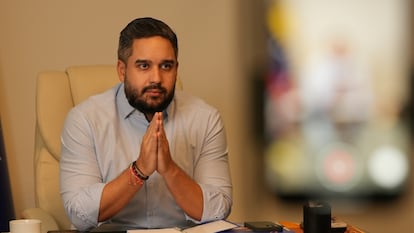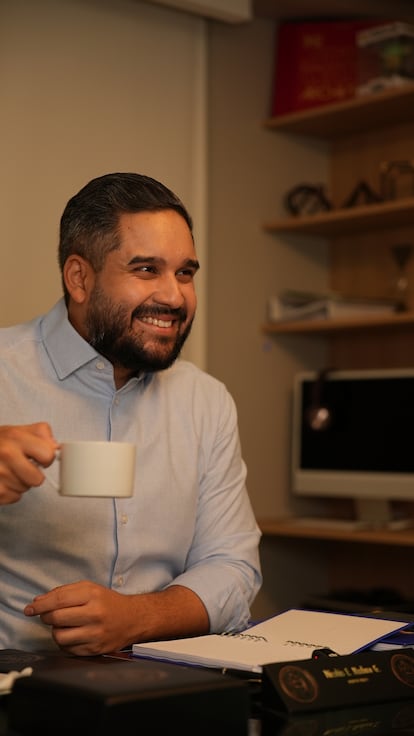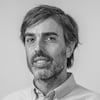Nicolás Maduro Guerra: ‘If Edmundo González wins, we will go into the opposition’
In a conversation with EL PAÍS, the son of the president of Venezuela expresses confidence in a Chavista victory at the polls on Sunday but gives assurances that they are also ready to recognize defeat

Inside Nicolás Maduro Guerra’s office, there is a banner from which hangs a Venezuelan flag, and a gamer chair from Iron Man, from the Marvel superhero saga. “I would tell you that my favorite character is Captain America, but that would be politically incorrect,” he jokes on the other side of the screen during the video conference. The 34-year-old son of the president of Venezuela has gone through two marriages and has six daughters, the first of which he had aged 15. Hugo Chávez, from whom his own father inherited power upon the former’s death in 2013, told a teenage Nicolás that he should join the army, but he could not picture himself with a rifle on his shoulder, so instead he trained as a musician in the Venezuelan orchestra system. He still practices the flute. He studied economics, at 22 he was chief inspector of the Presidency of the Republic and at 23, coordinator of the National Film School. He is currently a lawmaker in the National Assembly and in charge of religious affairs for the United Socialist Party of Venezuela (PSUV), the ruling party.
Sometimes, he receives calls from his father: “Nicolás, tell me what truth there is in this.” The president needs someone he can trust to offer him an honest opinion about a public official, or to tell him details about a rumor that is circulating in the Miraflores Palace, the seat of government. Maduro Guerra does not fit the classic image of the Chavista official; on the home screen of his cell phone he’s got the apps of the world’s main newspapers. He denies that his father, Nicolás Maduro Moros, is an authoritarian president or that there is political persecution in Venezuela, despite the continued complaints from international organizations, the arrest of people with ties to the opposition (more than 100 in this election campaign) and an investigation by the International Criminal Court.
The president’s only child participated in negotiations with the opposition in Mexico and Barbados. He is in favor of dialogue with the White House, but, in the usual rhetoric of Chavismo, he accuses the United States of never fulfilling its promises — Washington thinks exactly the same thing in the opposite direction. He has traveled to China to try to import ideas from communism to apply in the Venezuelan market, which is now experiencing a gradual recovery after years of brutal decline. Maduro Guerra is located in a second circle of trust around his father. Sitting in the first are the first lady, Cilia Flores, the political operators Jorge and Delcy Rodríguez, and Diosdado Cabello, in charge of the party. Next in line is Nicolasito, as some people call him.
Q. How do you see the presidential elections on July 28?
A. Very good, in our favor. We have been traveling all over the country. I haven’t seen what we see now on the street since 2012 [in which Hugo Chávez was re-elected], I have to confess. This campaign is very similar to that effervescence that I saw then. The analysis that we have on the table is that the other candidates, including the media candidate [Edmundo González Urrutia, the consensus candidate of the opposition], are stalled and we feel that we are in a good position to win, we are going to have a great victory.
Q. How many points do they tell you the victory is going to be by?
A. That’s just a headline. Look, they are telling us the victory is going to be comfortable [the most reliable polls show Urrutia as the winner, but Chavismo does not recognize those studies]. I don’t want to be triumphalist. I don’t like triumphalism because, for example, in 2015 we had some polls that showed us winning by a narrow margin and they all fell apart. Now we have designed a new measurement mechanism through Big Data, through focal (collecting group opinions). Through the same surveys, by crossing all that data, we get a number of between 8% and 10%, in the most conservative scenario.
Q. At some point, according to some people from Chavismo that I have spoken with, there were polls being looked at in Miraflores Palace that showed Edmundo as the winner.
A. We have never had figures this year that put us below [him]. Never. Not in January, not in February, not in March. At some point it was possible to talk about some type of technical tie, in the most conservative figures.
Q. And what could be expected of a new government after 11 years of your father in office? What should be addressed in these six coming years?
A. I believe that on July 29 the country must first awaken in peace. Whatever the result, and I tell you this with a full sense of responsibility, whatever the result. We are counting on a victory. History has already shown that if ever we don’t win, we acknowledge it. Always, in every election, every one. At least, the two national ones that have not been favorable to us. For the constitutional reform of 2007, I remember, we were in Miraflores Palace, and Chávez came out and said: ‘We didn’t win, period, we lost the reform.’ And in 2015, as soon as the National Electoral Council (CNE) released the results, we recognized them. We have to look at that percentage of the population that did not vote for us, and see how we can build a great national consensus, not only from the political point of view, which is crucial for the direction of a country, but also from the social point of view, from the economic point of view.

Q. According to you, what have been the successes of Nicolás Maduro Moros as president in the last six years?
A. We went from having national revenues of $50 billion to $700 million. That means 97% of the national revenue of the state collapsed; we are not talking about GDP, but the state’s revenue. And we experienced a very notable crisis. And yet, we did not close schools, we did not close hospitals. The state continued to have problems. The country remained in political calm. And now we are taking the country down the right path, despite being sanctioned, blocked, with the entire global financial world against it. And look at the indexes, the numbers speak for themselves. The numbers speak of a path of economic growth, of the control of inflation in the 36 months we have had exchange controls, of the large ventures that are emerging, of the international investments that are arriving.
Q. And what are the errors?
A. I drink coffee to think [he holds the cup for a few seconds and takes a few sips]. I think trusting some people that we thought were doing a good job and weren’t. So many people who were in the immediate environment, not just politicians. I’m talking about the personal, the family aspect. People who entered my house and who were given complete trust. And then we realized that they were embezzling funds. We were working hard to bring medicines, working hard to fix schools, to repair hospitals, with volunteers, working with paint, working with cement. And these people were taking the money.
Q. We are talking about Tareck El Aissami [former vice president and Minister of Oil detained for a corruption case that exceeds $3 billion]?
A. Of course.
Q. Listening to the president’s rallies, sometimes he himself is harsher against his own government than the opposition.
A. And not just in public. In private he is very tough. And we are very tough on ourselves, sometimes we self-flagellate more than the opposition itself. It is one of the characteristics, it is the attitude of the candidate. We are hard on ourselves and focus more on correcting the negative. An error is an error by the government, an error by the state, and that cannot be allowed. So we have to focus now on making the government more efficient.
Q. Let’s put ourselves in a scenario where Edmundo wins on Sunday, what would happen then?
A. We are going to win, I confirm it to you. I am apprehensive of some international media outlets. Not to an extreme point, but I do believe that they are very biased, that they do not see, they are not on the street. If Edmundo wins, we will hand over [power] and we will be in the opposition, period. I was not born into the presidency, my father was not born a president. I was born in the Valley, I studied in a public school. And if everything ends up with us being in the opposition, then so be it. I don’t know if people will be able to stand us as the opposition, we are a nuisance.
Q. Why did the presidential candidate reopen talks with the United States two weeks ago?
A. Because there should always be dialogue, even though they do not comply with their side of the bargain. Jorge Rodríguez [the president’s right-hand man] revealed a few months ago, in April I believe, a document that was signed in Qatar with [U.S. Assistant Secretary of State for Western Hemisphere Affairs] Brian A. Nichols, where they committed to a set of things. And we committed to others. We have fulfill everything. And they have fulfilled nothing, nothing, nothing. We want respectful relations with the United States. Who is our main historical partner? The United States is at the forefront. And they also need and want a relationship with us. They are trapped in their own game.
Q. What would a new Donald Trump presidency mean for Venezuela?
A. I couldn’t answer that now. It would be getting ahead of events. Because we are seeing a Trump who was very hard on us, very aggressive in the first term. But now, we see a Trump who does not like to lose. He likes to play winner.
Q. There has been criticism from other countries lately, from the international community and human rights organizations, over the trickle of arrests of members in the campaign of María Corina Machado [the opposition leader who has given her spot to Edmundo González]. Why is this happening to the opposition campaign and not to the Chavista one?
A. There is a sector that became accustomed to conspiring, to coming to power through violent means. And although I see some people, even friends of mine who are there with her, who genuinely believe in the electoral path, there are others who are looking to overcomplicate matters. We have laws here, we have a state. The Prosecutor’s Office, the state, will act when it discovers an element [of disruption]. I hope that on July 29, the majority of that sector will acknowledge the result and follow clear rules of the game.
Q. Do you understand the disillusionment felt by some Chavista groups?
A. These are natural political dynamics. There will be people who walk away from the project. And we have, for example, some opponents who have joined us. Venezuela can be a lot of things, but you never get bored here.
Q. Did you speak with the president of Colombia about a political agreement with the opposition prior to the elections?
A. I have no knowledge of that. I have not handled the issue of President Petro’s agreement.
Q. Would you welcome, in this last week of campaigning, signing an agreement where all parties pledge to accept the results?
A. There have already been several agreements. First we have Barbados, where it was said that the agreements would be respected based on political commitments. Then there was an agreement in the CNE, which is the electoral power, because there is a rule of law here. Many have chosen to ignore this rule of law. Venezuela has to re-institutionalize itself. We are already on the path to re-institutionalization. We must respect the agencies, the powers, the authorities. An agreement to recognize is always good. If they want to sign an agreement, I don’t see us disagreeing with that.
Q. Why do you think the Chinese economic model can be implemented in Venezuela?
A. We have to consider how successful that model has been, take aspects that can work for us and adapt them to the Venezuelan model. Socialism is the way for humanity to develop. Socialism with a strong market, with strong production, with strong companies. We are promoting private property, businesses. We are promoting collective property, cooperatives, communes. The Chinese model has shown that wealth can be generated and the inequality gap can be closed.
Q. What is Nicolás Maduro Moros like in private?
A. On the one hand he was always very affectionate, but when it came to attracting attention he hit the heart. He always had morals, he was always there for you. I was a teenage father, and from the first moment he was there with me and the girls, and later with my university career. He has always been a present dad, despite everything. He sometimes would arrive home tired from an activity and I would tell him: ‘Dad, give me five minutes to tell you something!’ And he would say, “What happened?” He would sit down and we’d talk. He was my role model, that’s why I try to always be present in my daughters’ lives.
Q. Do you want to be president?
A. I’m not going to say either no or yes. I see myself serving this process from whichever position. We aspire to serve Chávez. Truly, Chávez’s death had a general impact. It changed my life. Well, it changed the life of a country, but personally, it changed my life completely. Something I hadn’t even thought of. And history takes many turns. The important thing for us at this moment, to continue our process, is to win on the 28th.
Q. What I’ve been told is that around President Maduro there is a first circle of political trust where Jorge Rodríguez and Cilia Flores [the first lady, but not Nicolás’ mother] are situated. And then, you and other advisors.
A. He always listens to advice from everyone. More people have his phone number than you might think.
Q. I don’t have it.
A. I’ll send it to you right away.
Sign up for our weekly newsletter to get more English-language news coverage from EL PAÍS USA Edition
Tu suscripción se está usando en otro dispositivo
¿Quieres añadir otro usuario a tu suscripción?
Si continúas leyendo en este dispositivo, no se podrá leer en el otro.
FlechaTu suscripción se está usando en otro dispositivo y solo puedes acceder a EL PAÍS desde un dispositivo a la vez.
Si quieres compartir tu cuenta, cambia tu suscripción a la modalidad Premium, así podrás añadir otro usuario. Cada uno accederá con su propia cuenta de email, lo que os permitirá personalizar vuestra experiencia en EL PAÍS.
¿Tienes una suscripción de empresa? Accede aquí para contratar más cuentas.
En el caso de no saber quién está usando tu cuenta, te recomendamos cambiar tu contraseña aquí.
Si decides continuar compartiendo tu cuenta, este mensaje se mostrará en tu dispositivo y en el de la otra persona que está usando tu cuenta de forma indefinida, afectando a tu experiencia de lectura. Puedes consultar aquí los términos y condiciones de la suscripción digital.









































